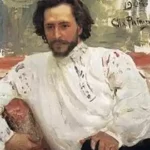 | |
The Seven That Were Hanged | |
| Author | Leonid Andreyev |
|---|---|
| Published |
1890
|
| Language | English |
| Original Language | Russian |
| Nationality | Russian |
| Genre | Russian Literature, Symbolism |
1890 Short Story
The Seven That Were Hanged
The Seven That Were Hanged is an English Russian Literature, Symbolism short story by Russian writer Leonid Andreyev. It was first published in 1890.
The Seven That Were Hanged
by Leonid Andreyev
I
“AT ONE O’CLOCK IN THE AFTERNOON, YOUR EXCELLENCY!”
As the Minister was a very fat man, predisposed to apoplexy, and as it was necessary therefore to spare him every dangerous emotion, the took the minutest precautions in warning him that a serious attempt upon his life had been planned. When they saw that he received the news calmly, they gave him the details: the attempt was to be made the next day, at the moment when His Excellency was to leave the house to go to make his report. A few terrorists, armed with revolvers and bombs, whom a police spy had betrayed and who were now being watched by the police, were to meet near the steps at one o’clock in the afternoon, and await the Minister’s exist. There the criminals would be arrested.
“Pardon me,” interrupted the Minister in surprise. “How do they know that I am to go to present my report at one o’clock in the afternoon, when I learned it myself only two days ago?”
The commander of the body-guard made a vague gesture signifying ignorance.
“At one o’clock in the afternoon, Your Excellency!”
Astonished, and at the same time satisfied with the police who had managed the affair so well, the Minister shook his head; a disdainful smile appeared on his thick red lips; quickly he made all the necessary preparations to pass the night in another palace; in no way did he wish to embarrass the police. His wife and children also were removed from the dangerous premises.
As long as the lights gleamed in this new residence, and while his familiars bustled about him expressing their indignation, the Minister felt a sensation of agreeable excitement. It seemed to him that he had just received, or was about to receive, a great and unexpected reward. But the friends went away, and the lights were put out. The intermittent and fanastic glare of the arc-lights in the street fell upon the ceiling and the walls, penetrating through the high windows, symbolizing, as it were, the fragility of all bolts and walls, the vanity of all supervision. Then, in the silence and the solitude of a strange chamber, the dignitary was seized with an unspeakable terror.
He was afflicted with a kidney trouble. Every violent emotion caused his face, feet, and hands to swell, and made him appear heavier, more massive. Now, like a heap of bloated flesh that made the bed-springs bend, he suffered the anguish of the sick as he felt his face puff up and become, as it were, something foreign to his body. His thought recurred obstinately to the cruel fate that his enemies were preparing for him. He evoked one after the other all the horrible attempts of recent date, in which bombs had been thrown against persons as noble as himself and bearing even higher titles, tearing their bodies into a thousand shreds, hurling their brains against foul brick walls, and knocking their teeth from their jaws. And, at these recollections, it seemed to him that his diseased body was another man’s body suffering from the fiery shock of the explosion. He pictured to himself his arms detached from his shoulders, his teeth broken, his brain crushed. His legs, stretched out in the bed, grew numb and motionless, the feet pointing upward, like those of a dead man. He breathed noisily, coughing occasionally, to avoid all resemblance to a corpse: he moved about, that he might hear the sound of the metallic springs; the rustling of the silk coverlet. And, to prove that he was really alive, he exclaimed in a loud and clear voice:
“Brave fellows! Brave fellows!”
These words of praise were for the police, the gendarmes, the soldiers, all those who protected his life and had prevented the assassination. But in vain did he stir about, lavish his praise, and smile at the discomfiture of the terrorists; he could not yet believe that he was saved. It seemed to him that the death evoked for him by the anarchists, and which existed in their thought, was already there and would remain there, refusing to go away until the assassins should be seized, deprived of their bombs, and lodged safely in prison. There it stood, in the corner yonder, declining to leave, and unable to leave, like an obedient soldier placed on guard by an unknown will.
“At one o’clock in the afternoon, Your Excellency!” This phrase came back to him continually, uttered in all tones, now joyously and ironically, now irritably, now obstinately and stupidly. One would have said that a hundred phonographs had been placed in the chamber, and were crying one after the other, with the idiotic persistence of machines:
“At one o’clock in the afternoon, Your Excellency!”
And this “one o’clock in the afternoon” of the next day, which so short a time before was in no way to be distinguished from other hours, had taken on a menacing importance; it had stepped out of the clock-dial, and was beginning to live a distinct life, stretching itself like an immense black curtain, to divide life into two parts. Before it and after it no other hour existed; it alone; presumptuous and obsessing, was entitled to a special life.
Grinding his teeth, the Minister raised himself in his bed to a sitting posture. It was positively impossible for him to sleep.
Pressing his bloated hands against his face, he pictured to himself with terrifying clearness how he would have risen on the morrow if he had been left in ignorance; he would have taken his coffee, and dressed. And neither he, or the Swiss who would have helped him on with his fur coat, or the valet who would have served his coffee, would have understood the uselessness of breakfasting and dressing, when a few moments later everything would be annihilated by the explosion. . . . The Swiss opens the door. . . . And it is he, this good and thoughtful Swiss, with the blue eyes, and the open countenance, and the numerous military decorationshe it is who opens the terrible door with his own hands. . . .
“Ah!” suddenly exclaimed the Minister aloud; slowly he removed his hands from his face. Gazing far before him into the darkness with a fixed and attentive look, he stretched out his hand to turn on the light. Then he arose, and in his bare feet walked around the strange chamber so unfamiliar to him; finding another light, he turned that on also. The room became bright and agreeable; there was only the disordered bed and the fallen coverlet to indicate a terror that had not yet completely disappeared.
Clad in a night-shirt, his beard in a tangle, a look of irritation on his face, the Minister resembled, those old people who are tormented by asthma and insomnia. One would have said that the death prepared for him by others had stripped him bare, had torn him from the luxury with which he was surrounded. Without dressing he threw, himself into an arm-chair, his eyes wandered to the ceiling.
“Imbeciles!” he cried in a contemptuous tone of conviction.
“Imbeciles!” And he was speaking of the policemen whom but a few moments before he had called “brave fellows,” and who, through excess of zeal, had told him all the details of the attack that had been planned.
“Evidently,” he thought with lucidity, “I am afraid now because I have been warned and because I know. But, if I had been left in ignorance, I should have taken my coffee quietly. And then, evidently, this death. . . . But am I then so afraid of death? I have a kidney trouble; some day I must die of it, and yet I am not afraid, because I don’t know when. And these imbeciles say to me: ‘At one o’clock in the afternoon, Your Excellency!’ They thought that I would be glad to know about it! . . . Instead of that, death has placed himself in the corner yonder, and does not go away! He does not go away, because I have that fixed idea! To die is not so terrible; the terrible thing is to know that one is going to die. It would be quite impossible for a man to live if he knew the hour and day of his death with absolute certainty. And yet these idiots warn me: ‘At one o’clock in the afternoon, Your Excellency!'”
Recently he had been ill, and the doctors had told him that he was going to die and should make his final arrangements. He had refused to believe them; and, in fact, he did not die. Once, in his youth, it had happened to him to get beyond his depth; he had decided to put an end to his existence; he had loaded his revolver, written some letters, and even fixed the hour of his suicide; then, at the last moment, he had reconsidered. And always, at the supreme moment, something unexpected may happen; consequently no man can know when he will die.
“At one o’clock in the afternoon, Your Excellency!” these amiable idiots had said to him. They had informed him only because his death had been plotted; and yet he was terrified simply to learn the hour when it might have occurred. He admitted that they would kill him some day or other, but it would not be the next day . . . it would not be the next day, and he could sleep quietly, like an immortal being. . . . The imbeciles! They did not know what a gulf they had dug in saying, with stupid amiability: “At one o’clock in the afternoon, Your Excellency!”
From the bitter anguish that shot through his heart, the Minister understood that he would know neither sleep, nor rest, nor joy, until this black and accursed hour, thus detached from the course of time, had passed. It was enough in itself to annihilate the light and enwrap the man in the opaque darkness of fear. Now that he was awake, the fear of death permeated his entire body, filtered into his bones, exuded from every pore.
Already the Minister had ceased to think of the assassins of the morrow: they had disappeared, forgotten in the multitude of inauspicious things that surrounded his life. He feared the unexpected, the inevitable: an attack of apoplexy, a laceration of the heart, the rupture of a little artery suddenly made powerless to resist the flow of blood and splitting like a glove on swollen hands.
His thick, short neck frightened him; he dared not look at his swollen fingers, full of some fatal fluid. And though, just before, in the darkness, he had been compelled to stir in order to avoid resemblance to a corpse, now, under this bright, cold, hostile, frightful light, it seemed to him horrible, impossible, to move even to light a cigarette or ring for a servant. His nerves were at a tension. With red and upturned eyes and burning head, he stifled.
Suddenly, in the darkness of the sleeping house, the electric bell just under the ceiling, among the dust and spiders’ webs, became animate. Its little metallic tongue beat hurriedly against its sonorous edge. It stopped for a moment, and then began to ring again in a continuous and terrifying fashion.
People came running. Here and there lamps were lighted on the walls and chandelierstoo few of them for intense illumination, but enough to create shadows. On every hand appeared these shadows: they arose in the corners and stretched out upon the ceiling, fastening upon all projections and running along the walls. It was difficult to understand where all these taciturn, monstrous, and innumerable shadows could have kept themselves beforemute souls of mute things.
A thick and trembling voice said something indistinguishable. Then they telephoned to the doctor: the Minister was ill. His Excellency’s wife was summoned also.
II
SENTENCED TO BE HANGED
The predictions of the police were realized. Four terrorists, three men and one woman, carrying bombs, revolvers, and infernal machines, were taken in front of the steps of the residence; a fifth accomplice was arrested at her dwelling, where the implements had been manufactured and the conspiracy planned. A large quantity of dynamite and many weapons were found there. All five were very young: the eldest of the men was twenty-eight, the younger of the women nineteen. They were tried in the fortress where they had been imprisoned after their arrest; they were tried quickly and secretly, as was the custom at that merciless epoch.
Before the court all five were calm, but serious and thoughtful; their contempt for the judges was so great that they did not care to emphasize their fearlessness by a useless smile or a pretence of gaiety. They were just tranquil enough to protect their souls and the deep gloom of their agony from the malevolent gaze of strangers. Some questions they refused to answer, some they answered simply, briefly, precisely, as if they were speaking, not to judges, but to statisticians desirous of completing tables of figures. Three of them, one woman and to men, gave their real names; two refused to disclose their identity, which remained unknown to the court. In everything that happened they manifested that distant and attenuated curiosity peculiar to people seriously ill or possessed by a single all-powerful idea. They cast swift glances, seized upon an interesting word in its flight, and went back to their thoughts, resuming them at the exact point where they had dropped them.
The accused placed nearest the judges had given his name as Sergey Golovin, a former officer, son of a retired colonel. He was very young, with broad shoulders, and so robust that neither the prison or the expectation of certain death had been able to dim the color of his cheeks or the expression of happy innocence in his blue eyes. Throughout the trial he twisted his thick blond beard, to which he had not yet become accustomed, and gazed steadily at the window, knitting his brows.
It was the latter part of winter, that period into which, among snowstorms and gray, cold days, the approaching spring projects sometimes, as a forerunner, a warm and luminous day, or even a single hour, so passionately young and sparkling that the sparrows in the street become mad with joy and men seem intoxicated. Now, through the upper window, still covered with the dust of the previous summer, a very odd and beautiful sky was to be seen; at the first glance it seemed a thick and milky gray; then, upon a second examination, it appeared to be covered with azure stains, of an ever-deepening blue, a blue pure and infinite. And because it did not strip itself suddenly, but modestly draped itself in the transparent veil of clouds, it became charming, like one’s fiancée. Sergey Golovin looked at the sky, pulled at his mustache, winked now one and now the other of his eyes behind the long, heavy eyelashes, and reflected profoundly on nobody knows what. Once, even, his fingers moved rapidly, and an expression of naïve joy appeared upon his face; but he looked around him, and his joy was extinguished like a live coal upon which one steps. Almost instantaneously, almost without transition, the redness of his cheeks gave place to a corpse-like pallor; a fine hair painfully pulled out was pressed as in a vice between his bloodless finger-ends. But the joy of life and of the spring was still stronger. A few minutes later the young face resumed its naïve expression and sought again the sky of spring.
Toward the sky also looked an unknown young girl, surnamed Musya. She was younger than Golovin, but seemed his elder because of the severity, the gravity, of her proud and loyal eyes. The delicate neck and slender arms alone revealed that intangible something which is youth itself, and which sounded so distinctly in the pure harmonious voice that resembled a costly instrument in perfect tune. Musya was very pale, of that passionate pallor peculiar to those who burn with an inner, radiant, and powerful fire. She scarcely stirred; from time to time only, with a gesture that was hardly visible, she felt for a deep trace in the third finger of her right handthe trace of a ring recently removed. She looked at the sky with calmness and indifference; she looked at it simply because everything in this commonplace and dirty hall was hostile to her and seemed to scrutinize her face. This bit of blue sky was the only pure and true thing upon which she could look with confidence.
The judges pitied Sergey Golovin and hated Musya.
Musya’s neighbor, motionless also, with hands folded between his knees and somewhat of affectation in his pose, was an unknown surnamed Werner. If one can bolt a face as one bolts a heavy door, the unknown had bolted his as if it were a door of iron. He gazed steadily at the floor, and it was impossible to tell whether he was calm or deeply moved, whether he was thinking of something or listening to the testimony of the policemen. He was rather short of stature; his features were fine and noble. He gave the impression of an immense and calm force, of a cold and audacious valor. The very politeness with which he uttered his clear and curt replies seemed dangerous on his lips. On the backs of the other prisoners the customary cloak seemed a ridiculous costume; on him it was not even noticeable, so foreign was the garment to the man. Although Werner had been armed only with a poor revolver, while the others carried bombs and infernal machines, the judges looked upon him as the leader, and treated him with a certain respect, with the same brevity which he employed toward them.
In his neighbor, Vasily Kashirin, a frightful moral struggle was going on between the intolerable terror of death and the desperate desire to subdue this fear and conceal it from the judges. Ever since the prisoners had been taken to court in the morning, he had been stifling under the hurried beating of his heart. Drops of sweat appeared continually on his brow; his hands were moist and cold; his damp and icy shirt, sticking to his body, hindered his movements. By a superhuman effort of the will he kept his fingers from trembling, and maintained the firmness and moderation of his voice and the tranquillity of his gaze. He saw nothing around him; the sound of the voice that he heard seemed to reach him through a fog, and it was in a fog also that he stiffened himself in a desperate effort to answer firmly and aloud. But, as soon as he had spoken, he forgot the questions, as well as his own phrases; the silent and terrible struggle began again. And upon his person death was so in evidence that the judges turned their eyes away from him. It was as difficult to determine his age as that of a rotting corpse. According to his papers he was only twenty-three. Once or twice Werner touched him gently on the knee, and each time he answered briefly:
“It’s nothing.”
His hardest moment was when he suddenly felt an irresistible desire to utter inarticulate cries, like a hunted beast. Then he gave Werner a slight push; without raising his eyes, the latter answered in a low voice:
“It’s nothing, Vasya. It will soon be over!”
Consumed by anxiety, Tanya Kovalchuk, the fifth terrorist, sheltered her comrades with a maternal look. She was still very young; her cheeks seemed as highly colored as those of Sergey Golovin; and yet she seemed to be the mother of all the accused, so full of tender anxiety and infinite love were her looks, her smile, her fear. The progress of the trial did not interest her. She listened to her comrades simply to see if their voices trembled, if they were afraid, if they needed water.
But she could not look at Vasya; his anguish was too intense; she contented herself with cracking her plump fingers. At Musya and Werner she gazed with proud and respectful admiration, her face then wearing a grave and serious expression. As for Sergey Golovin, she continually tried to attract his attention by her smile.
“The dear comrade, he is looking at the sky. Look, look!” thought she, as she observed the direction of his eyes.
“And Vasya? My God! My God! . . . What can be done to comfort him? If I speak to him, perhaps it will make matters worse; suppose he should begin to weep?”
Like a peaceful pool reflecting every wandering cloud, her amiable and clear countenance showed all the feelings and all the thoughts, however fleeting, of her four comrades. She forgot that she was on trial too and would be hanged; her indifference to this was absolute. It was in her dwelling that the bombs and dynamite had been found; strange as it may seem, she had received the police with pistol shots, and had wounded one of them in the head.
The trial ended toward eight o’clock, just as the day was drawing to its close. Little by little, in the eyes of Sergey and Musya, the blue sky disappeared; without reddening, without smiling, it grew dim gently as on a summer evening, becoming grayish, and suddenly cold and wintry. Gotovin heaved a sigh, stretched himself, and raised his eyes toward the window, where the chilly darkness of the night was already making itself manifest; still pulling his beard, he began to examine the judges, the soldiers, and their weapons, exchanging a smile with Tanya Kovalchuk. As for Musya, when the sun had set completely, she did not lower her gaze to the ground, but directed it toward a corner where a spider’s web was swaying gently in the invisible current of warm air from the stove; and thus she remained until the sentence had been pronounced.
After the verdict, the condemned said their farewells to their lawyers, avoiding their disconcerted, pitying, and confused looks; then they grouped themselves for a moment near the door, and exchanged short phrases.
“It’s nothing, Vasya! All will soon be over!” said Werner.
“But there is nothing the matter with me, brother!” answered Kashirin, in a strong, quiet, and almost joyous voice. In fact, his face had taken on a slight color, no longer resembling that of a corpse.
“The devil take them! They have hanged us all just the same!” swore Golovin naïvely.
“It was to have been expected,” answered Werner, without agitation.
“To-morrow the final judgment will be rendered, and they will put us all in the same cell,” said Tanya, to console her comrades. “We shall remain together until the execution.”
Silently, and with a resolute air, Musya started off.
III
“I MUST NOT BE HANGED”
A fortnight before the affair of the terrorists, in the same court, but before other judges, Ivan Yanson, a peasant, had been tried and sentenced to be hanged.
Ivan Yanson had been hired as a farm-hand by a well-to-do farmer, and was distinguished in no way from the other poor devils of his class. He was a native of Wesenberg, in Esthonia; for some years he had been advancing gradually toward the capital, passing from one farm to another. He had very little knowledge of Russian. As there were none of his countrymen living in the neighborhood, and as his employer was a Russian, named Lazaref, Yanson remained silent for almost two years. He said hardly a word to either man or beast. He led the horse to water and harnessed it without speaking to it, walking about it lazily, with short hesitating steps. When the horse began to run, Yanson did not say a word, but beat it cruelly with his enormous whip. Drink transformed his cold and wicked obstinacy into fury. The hissing of the lash and the regular and painful sound of his wooden shoes on the floor of the shed could be heard even at the farmhouse. To punish him for torturing the horse the farmer at first beat Yanson, but, not succeeding in correcting him, he gave it up.
Once or twice a month Yanson got drunk, especially when he took his master to the station. His employer once on board the train, Yanson drove a short distance away, and waited until the train had started.
Then he returned to the station, and got drunk at the buffet. He came back to the farm on the gallop, a distance of seven mlles, beating the unfortunate beast unmercifully, giving it its head, and singing and shouting incomprehensible phrases in Esthonian. Sometimes silent, with set teeth, impelled by a whirlwind of indescribable fury, suffering, and enthusiasm, he was like a blind man in his mad career; he did not see the passers-by, he did not insult them, uphill and down he maintained his furious gait.
His master would have discharged him, but Yanson did not demand high wages, and his comrades were no better than he.
One day he received a letter written in Esthonian; but, as he did not know how to read or write, and as no one about him knew this language, Yanson threw it into the muck-heap with savage indifference, as if he did not understand that it brought him news from his native country. Probably needing a woman, he tried also to pay court to the girl employed on the farm. She repulsed him, for he was short and puny, and covered with hideous freckles; after that, he left here alone.
But, though he spoke little, Yanson listened continually. He listened to the desolate snow-covered fields, containing hillocks of frozen manure that resembled a series of little tombs heaped up by the snow; he listened to the bluish and limpid distance, the sonorous telegraph-poles. He alone knew what the fields and telegraph-poles were saying. He listened also to the conversation of men, the stories of murder, pillage, fire.
One night, in the village, the little church-bell began to ring in a feeble and lamentable way; flames appeared. Malefactors from nobody knew where were pillaging the neighboring farm. They killed the owner and his wife, and set fire to the house. This caused a feeling of anxiety on the farm where Yanson lived: day and night the dogs were loose; the master kept a gun within reach of his bed. He wished also to give an old weapon to Yanson, but the latter, after examining it, shook his head and refused it. The farmer did not understand that Yanson had more confidence in the efficacy of his Finnish knife than in this rusty old machine.
“It would kill me myself!” saîd he.
“You are only an imbecile, Ivan!”
And one winter evening, when the other farm-hand had gone to the station, this same Ivan Yanson, who was afraid of a gun, committed robbery and murder, and made an attempt at rape. He did it with an astonishing simplicity. After shutting the servant in the kitchen, lazily, like a man almost dead with sleep, he approached his master from behind, and stabbed him several times in the back. The master fell unconscious; his wife began to cry and to run about the chamber. Showing his teeth, and holding his knife in his hand, Yanson began to ransack trunks and drawers. He found the money; then, as if he had just seen the master’s wife for the first time, he threw himself upon her to rape her, without the slightest premeditation. But he happened to drop his knife; and, as the woman was the stronger, she not only resisted Yanson, but half strangled him. At this moment the farmer recovered his senses, and the servant broke in the kitchen-door and came in. Yanson fled. They took him an hour later, squatting in the corner of the shed, and scratching matches which continually went out. He was trying to set fire to the farm.
A few days later the farmer died. Yanson was tried and sentenced to death. In the court one would have said that he did not understand what was going on; h viewed the large imposing hall without curiosity, and explored his nose with a shrunken finger that nothing disgusted. Only those who had seen him at church on Sunday could have guessed that he had done something in the way of making a toilet; he wore a knitted cravat of dirty red; in spots his hair was smooth and dark; in others it consisted of light thin locks, like wisps of straw on an uncultivated and devastated field.
When the sentence of death by hanging was pronounced, Yanson suddenly showed emotion. He turned scarlet, and began to untie and tie his cravat, as if it were choking him. Then he waved his arms without knowing why, and declared to the presiding judge, who had read the sentence:
“She has said that I must be hanged.”
“‘She’? Who?” asked the presiding judge, in a deep bass voice.
Yanson pointed at the presiding judge with his finger, and, looking at him furtively, answered angrily:
“You!”
“Well?”
Again Yanson turned his eyes toward one of the judges, in whom he divined a friend, and repeated:
“She has said that I must be hanged. I must not be hanged.”
“Take away the accused.”
But Yanson still had time to repeat, in a grave tone of conviction:
“I must not be hanged.”
And with his outstretched finger and irritated face, to which he tried in vain to give an air of gravity, he seemed so stupid that the guard, in violation of orders, said to him in an undertone as he led him away:
“Well, you are a famous imbecile, you are!”
“I must not be hanged!” repeated Yanson, obstinately.
They shut him up again in the cell in which he had passed a month, and to which he had become accustomed, as he had become accustomed to everything: to blows, to brandy, to the desolate and snow-covered country sown with rounded hillocks resembling tombs. It even gave him pleasure to see his bed again, and his grated window, and to eat what they gave him; he had taken nothing since morning. The disagreeable thing was what had happened in court, about which he knew not what to think. He had no idea at all of what death by hanging was like.
The guard said to him, in a tone of remonstrance:
“Well, brother, there you are, hanged!”
“And when will they bang me?” asked Yanson, in a tone of incredulity. The guard reflected.
“Ah! wait, brother; you must have companions; they do not disturb themselves for a single individual, and especially for a little fellow like you.”
“Then, when?” insisted Yanson.
He was not offended that they did not want to take the trouble to hang him all alone; he did not believe in this excuse, and thought they simply wanted to put off the execution, and then pardon him.
“When? When?” resumed the guard. “It is not a question of hanging a dog, which one takes behind a shed and dispatches with a single blow! Is that what you would like, imbecile?”
“Why, no, I would not like it!” said Yanson suddenly with a joyous grimace. “‘Twas she that said I must be hanged, but I, I do not want to be hanged!”
And, for the first time in his life perhaps, he began to laugha grinning and stupid laugh, but terribly gay. He seemed like a goose beginning to quack. The guard looked at Yanson in astonishment, and then knitted his brows: this stupid gaiety on the part of a man who was to be executed insulted the prison, the gallows itself, and made them ridiculous. And suddenly it seemed to the old guard, who had passed all his life in prison and considered the laws of the gaol as those of nature, that the prison and all of life were a sort of mad-house in which he, the guard, was the chief madman.
“The devil take you!” said he, spitting on the ground. “Why do you show your teeth? This is no wine-shop!”
“And I, I do not want to be hanged! Ha! ha! ha!”
Yanson laughed always.
“Satan!” replied the guard, crossing himself.
All the evening Yanson was calm, and even joyous. He repeated the phrase that he had uttered: “I must not be hanged,” and so convincing, so irrefutable was it that he had no occasion for anxiety. He had long since forgotten his crime; sometimes he simply regretted that he had not succeeded in raping the woman. Soon he thought no more about the matter.
Every morning Yanson asked when he would be hanged, and every morning the guard answered him angrily:
“You have time enough.” And he went out quickly, before Yanson began to laugh.
Thanks to this invariable exchange of words, Yanson persuaded himself that the execution would never take place; for whole days he lay upon his bed, dreaming vaguely of the desolate and snow-covered fields, of the buffet at the railway station, and also of things farther away and more luminous. He was well fed in prison, he took on flesh.
“She would love me now,” he said to himself, thinking of his master’s wife. “Now I am as big as her husband.”
He had only one desireto drink brandy and course madly over the roads with his horse at full gallop.
When the terrorists were arrested, the whole prison learned of it. One day, when Yanson put his customary question, the guard answered him abruptly, in an irritated voice:
“It will be soon. In a week, I think.”
Yanson turned pale; the gaze of his glassy eyes became so thick that he seemed as if asleep.
“You are







